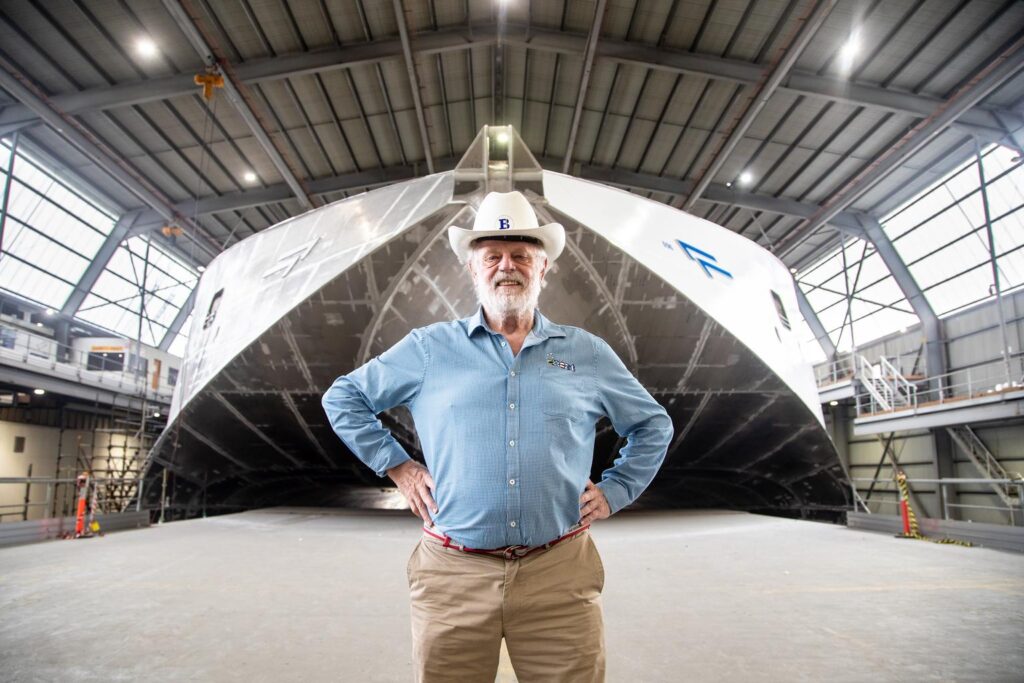
Tasmanian shipbuilder Incat has secured a significant contract to construct two large electric ferries for Denmark, a project hailed as a transformative moment for the global maritime industry. The 129-metre vessels, equipped with 45,000 kWh battery systems, are set to operate on one of Europe’s busiest ferry routes, connecting Jutland and Zealand.
Danish ferry operator Molslinjen is anticipated to receive the first of these groundbreaking ships by late 2027. Each ferry will have the capacity to carry up to 1,483 passengers and 500 cars, cruising at speeds exceeding 40 knots. This development represents a pivotal shift not only for Incat but for maritime transportation worldwide.
Revolutionizing Maritime Transport
Incat Chairman Robert Clifford expressed the significance of this contract, stating, “These new vessels for Molslinjen mark a turning point not just for Incat but for the global maritime industry. They are part of a new class of high-speed, low-emission ships that are redefining what’s possible at sea.”
The announcement comes as Incat plans to double its workforce and production capacity at its Prince of Wales Bay shipyard over the next three years. Construction on the Danish ferries is set to commence in the coming months, with each ship expected to significantly reduce CO2 emissions on the busy Kattegat route.
Strengthening Ties with Denmark
Incat’s relationship with Denmark is longstanding, underscored by its collaboration with Molslinjen. Clifford remarked, “Incat has a long and trusted relationship with Denmark through our work with Molslinjen and I’m particularly proud to see this next chapter unfold. These vessels will connect communities across the Kattegat with high-speed, clean energy technology and they’ll be built right here in Tasmania.”
This project is part of Incat’s broader strategy to enhance its capabilities in sustainable shipping. The company has already established a reputation for innovation, having constructed the world’s largest battery-electric vessel and a 78-metre hybrid ferry.
Meeting Global Demand for Sustainable Ferries
The planned expansion of Incat’s Hobart facility will enable the company to deliver more large ships annually, positioning it to meet the increasing global demand for eco-friendly ferry transport. As Clifford noted, “As global demand for sustainable ferries accelerates, our expanded facilities will ensure we’re ready to lead the way in both innovation and volume.”
Meanwhile, the maritime industry is increasingly focusing on sustainability, with electric and hybrid vessels becoming more prevalent. This shift is driven by environmental regulations and a growing awareness of the need to reduce carbon footprints. Incat’s new contract aligns with these trends, offering a glimpse into the future of maritime transportation.
Implications for the Future
The move represents a significant step forward in the adoption of clean energy technologies in maritime transport. Once operational, the new ferries are expected to cut thousands of tonnes of CO2 emissions annually, contributing to global efforts to combat climate change.
Looking ahead, the success of this project could pave the way for further innovation in the industry, encouraging other shipbuilders to invest in sustainable technologies. As Incat continues to expand its capabilities, it is well-positioned to play a leading role in the future of green maritime transport.
In conclusion, Incat’s landmark contract to build electric ferries for Denmark not only strengthens its ties with Europe but also sets a new standard for sustainable shipping. The project’s success could have far-reaching implications, inspiring further advancements in clean maritime technology worldwide.






